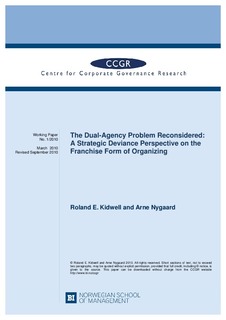| dc.contributor.author | Kidwel, Roland E. | |
| dc.contributor.author | Nygaard, Arne | |
| dc.date.accessioned | 2012-09-03T09:13:34Z | |
| dc.date.available | 2012-09-03T09:13:34Z | |
| dc.date.issued | 2010 | |
| dc.identifier.uri | http://hdl.handle.net/11250/95410 | |
| dc.description.abstract | Drawing on various theoretical streams, including organizational deviance, we propose that a franchisor cannot assess and control opportunism without comparative information from plural form contractual arrangements provided by both franchisee relationships and operating its own units. Moving beyond dyadic perspectives, our strategic deviance model suggests why franchisors accept deviant behavior that results from vertical and horizontal agency problems. The plural form provides benchmark information to the franchisor that curbs even greater levels of costly shirking and free riding behaviors. Thus, company manager and franchisee opportunism is managed through self enforcing social control, tournaments in internal quasi-markets and social comparison mechanisms. | no_NO |
| dc.language.iso | eng | no_NO |
| dc.publisher | BI Norwegian Business School | no_NO |
| dc.relation.ispartofseries | CCGR Working Paper;1/2010 | |
| dc.subject | deviant behavior | no_NO |
| dc.subject | shirking | no_NO |
| dc.subject | free riding | no_NO |
| dc.subject | plural model | no_NO |
| dc.subject | multi-agent theory | no_NO |
| dc.title | The Dual-Agency Problem Reconsidered: A Strategic Deviance Perspective on the Franchise Form of Organizing | no_NO |
| dc.type | Working paper | no_NO |
| dc.source.pagenumber | 37 pages | no_NO |
